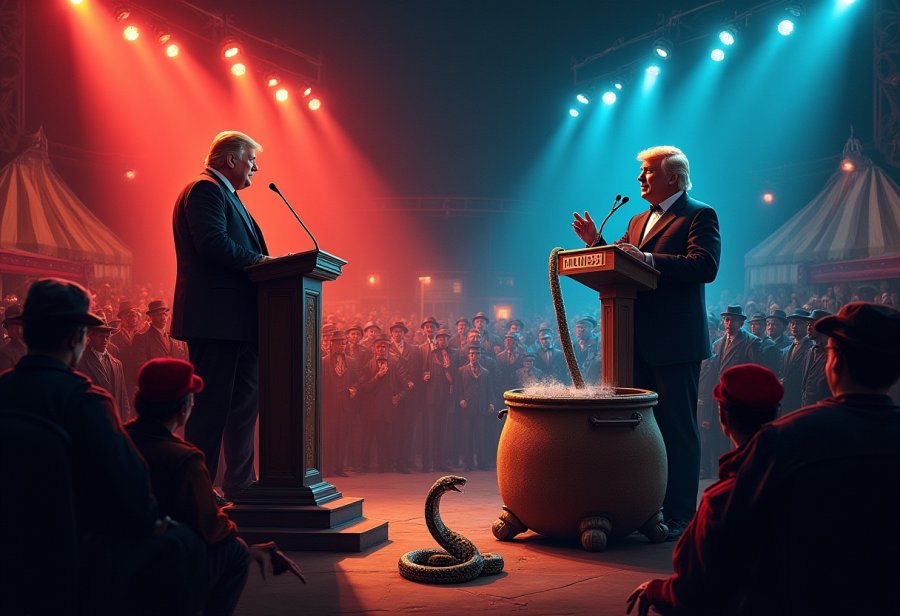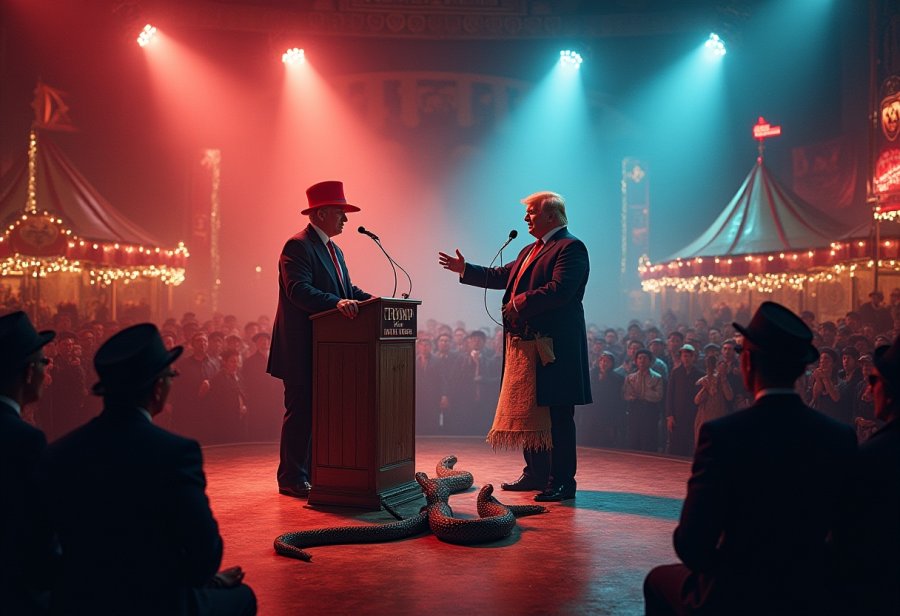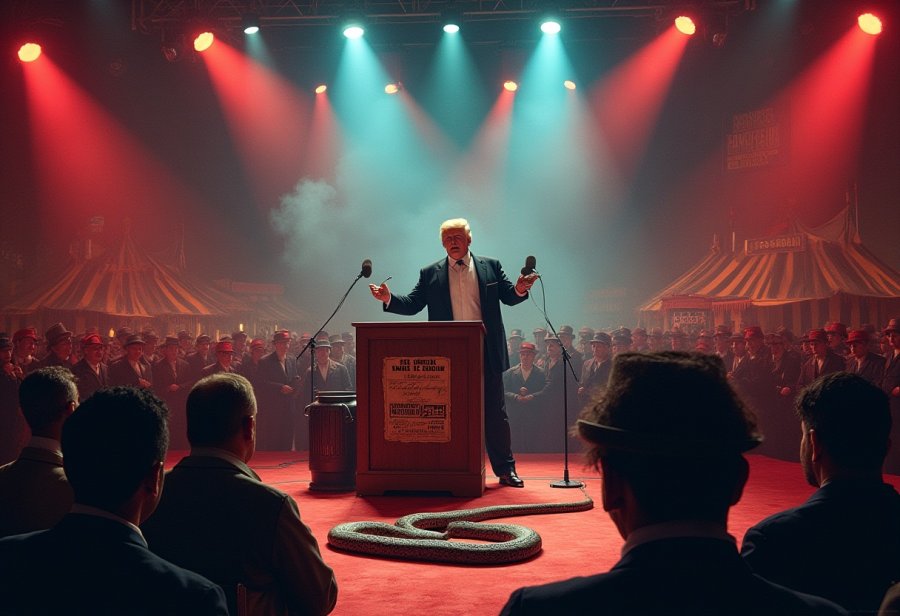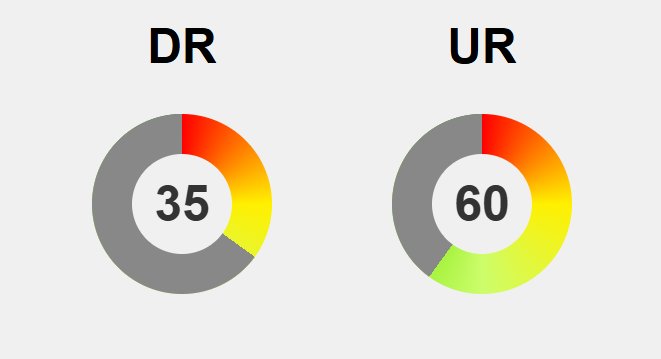Why are Americans irresistibly drawn to charismatic figures offering simple solutions to complex problems? This enduring fascination reveals a deep-rooted psychological longing for certainty and hope amid chaos. From historic medicine shows to modern political rallies, spectacle and showmanship have long been tools to forge emotional bonds and influence public perception. Leaders like Clark Stanley and Donald Trump understood that emotional appeal and sensational performance often eclipse substance, tapping into our instinctive craving for quick fixes. This allure isn’t just superficial; it exposes a collective desire for instant relief and clear narratives, even if they’re rooted in deception. But what does this say about democracy itself? Are we seeking genuine cures or succumbing to the siren call of snake oil? Recognizing this pattern is crucial—not to dismiss charisma, but to foster critical thinking and resilience. Only then can we protect the integrity of democratic discourse and steer society toward authentic solutions.

Why Americans Chase Charismatic Leaders Offering Simple Fixes
Why are Americans so drawn to leaders who promise simple solutions to complex problems? It’s a question that touches on a core aspect of American culture—our collective love for charisma and clear narratives. From the earliest days of the nation, figures who can cut through chaos with confidence and flair have captivated audiences. They offer more than ideas; they provide a sense of certainty and hope that feels especially comforting in turbulent times. Their slogans and stories make complicated issues seem manageable, giving supporters a quick mental shortcut in uncertain moments.
This attraction isn’t just about politics; it’s rooted in human psychology. When faced with overwhelming problems, our brains instinctively seek patterns and straightforward answers. During crises—whether economic, social, or personal—simple solutions feel like a way to regain control. Charismatic leaders understand this deeply. They craft messages that promise quick fixes, wrapping complex realities in catchy slogans like “Build the wall” or “Drain the swamp.” These become symbols of reassurance, even if they oversimplify or ignore nuance.
Historically, American campaigns have relied heavily on spectacle and showmanship. From 19th-century medicine shows to modern rallies, leaders have used entertainment to forge emotional bonds. These events turn serious issues into dramatic performances—designed to inspire trust and loyalty. Just as Clark Stanley’s snake oil demonstrations captivated crowds with theatrical flair, today’s political rallies leverage visual drama and emotional appeals to energize supporters. Both rely on the power of spectacle to persuade.
The myth of quick cures, like snake oil, runs deep in American history. While some original snake oils did contain genuine medicinal ingredients—like omega-3-rich Chinese water snakes—their reputation was tarnished by fraud and deception. Today, political figures sell their own “snake oil,” wrapping promises of instant salvation in slogans that resonate emotionally. The appeal remains the same: a desire for immediate relief, even if the solutions are illusory.
This enduring fascination reveals a fundamental trait of the American spirit: a hope that problems can be solved with a miracle, a quick fix, or a charismatic savior. It’s a testament to our optimism, our tendency to believe in straightforward answers, and our willingness to invest faith in leaders who promise to deliver. In a complex world, the allure of simple solutions remains irresistible, highlighting both our hopes and our vulnerabilities.
From Medicine Shows to Modern Rallies: The Legacy of Spectacle and Persuasion
Since America’s earliest days, spectacle and entertainment have played a crucial role in shaping how leaders connect with the public. In the 19th century, rallies, parades, and medicine shows blurred the line between persuasion and performance. These gatherings weren’t just about sharing ideas—they created shared emotional experiences that built loyalty and trust. Politicians and entrepreneurs quickly learned that dramatic displays and theatrical flair could sway opinions and forge social identities, setting the stage for modern campaign rallies and media events.
Medicine shows exemplified this blend of entertainment and salesmanship. These events combined colorful characters, dramatic demonstrations, and theatrical antics to sell supposed cures. Crowds watched in awe as a performer pulled a live rattlesnake from a sack, sliced it open, and claimed the resulting fat could cure everything from arthritis to stomach ailments. These shows didn’t just sell medicine—they captivated audiences, turning persuasion into spectacle that fostered trust and emotional bonds. Their goal was entertainment as much as commerce, demonstrating how showmanship could influence public perception.
This performative approach wasn’t limited to medicine. Politicians adopted similar tactics to energize supporters. Clark Stanley’s “Rattlesnake King” act at the 1893 Chicago World’s Fair, for example, turned a simple product into a mythic cure through theatrical antics. His dramatic performance evoked hope and fear, transforming the mundane into the extraordinary. These performances created emotional narratives that made audiences feel part of something larger—an effective strategy that remains embedded in political events today.
Looking ahead, the connection between spectacle and persuasion only deepened. Modern campaigns, like Donald Trump’s rallies, are less about policy and more about entertainment. They feature roaring crowds, dramatic music, and visual cues that turn politics into a show. Leaders understand that emotional and visual impact can override detailed arguments, making spectacle a central tool for shaping perceptions and energizing supporters.
The roots of American spectacle run deep. From the grandiose medicine shows of the 19th century to today’s high-energy rallies, leaders have understood the power of emotional engagement. They craft performances that evoke feelings—hope, pride, fear—often more influential than facts. This tradition reveals a fundamental truth: spectacle isn’t just entertainment; it’s a way to forge emotional bonds, reinforce social identities, and make complex issues feel simpler and more manageable.

The Psychology Behind Our Love for Quick, Easy Solutions
Humans have an innate tendency to favor simple answers, especially when faced with complex or confusing problems. Our brains are wired for pattern recognition and quick decision-making, which makes straightforward solutions especially appealing during moments of uncertainty. When the world feels unpredictable—whether due to economic upheaval, social unrest, or personal crises—people instinctively seek clarity. These simple answers serve as mental shortcuts, offering a sense of control and hope when everything seems chaotic.
This preference isn’t just about comfort; it’s deeply rooted in our evolutionary history. Our ancestors needed to make rapid judgments to survive threats or find shelter. Recognizing a predator or choosing a safe hiding spot had to happen swiftly, often based on incomplete information. These quick judgments laid the groundwork for our modern desire for decisive, easy solutions, even when they oversimplify reality. When faced with multifaceted issues, our minds latch onto clear-cut ideas that promise immediate relief.
Charismatic leaders understand this instinct perfectly. They craft messages that tap into our craving for simplicity, distilling complex issues into memorable slogans or compelling stories. Phrases like “Build the wall” or “Drain the swamp” aren’t detailed policy proposals; they are emotionally charged ideas that promise quick fixes. These slogans resonate because they align with our desire for certainty, making us feel as if problems are solvable with a single bold move, even if the actual solutions are more complicated.
History shows that societies under stress often turn to figures offering these straightforward answers. The snake oil salesmen of the 19th century sold miracle cures that promised instant health, appealing to hopes for quick relief. Today’s populists sell similar ideas—easy answers wrapped in emotional appeals—that feed our universal longing for immediate solutions. This tendency can distort judgment, especially when desperation clouds reasoning, leading us to accept stories that make us feel better or safer, regardless of their truth.
Our craving for quick fixes also fulfills deeper human needs: belonging, understanding, and the hope that chaos can be tamed overnight. When faced with societal issues, many seek a hero who can sweep away difficulties with a single gesture. This yearning for miracle cures is universal, crossing cultures and eras, and it explains why the allure of simple solutions remains so persistent. It’s a testament to our hope that, somehow, everything can be made better overnight—despite the complex reality we often face.
This persistent desire for straightforward answers highlights the importance of critical thinking and skepticism. By understanding the psychological roots of this tendency, we can better resist the allure of misleading solutions. For more insights on this topic, you might find this article on critical thinking particularly helpful.
Spectacle in Politics Today: Entertainment Shapes Public Perception
In today’s political arena, spectacle and entertainment are more than just accessories—they are central to how campaigns are won and leaders shape public perception. Modern political events resemble grand productions, filled with dramatic speeches, eye-catching visuals, and viral moments designed to command attention far beyond traditional debates. Media coverage amplifies these spectacles, turning rallies and televised appearances into entertainment that dominates headlines and social media feeds. This emphasis on style over substance makes it easier for charismatic figures to connect emotionally, often prioritizing showmanship over detailed policy discussions.
The 2016 U.S. presidential race exemplifies this shift. Donald Trump’s rallies weren’t typical political gatherings; they felt more like concerts or sporting events. His energetic entrances, chants from supporters, and visual cues created an immersive experience that energized his base and shaped perceptions. Social media has only deepened this trend, with viral videos, catchy soundbites, and provocative posts spreading rapidly. Leaders who master entertainment can bypass critical scrutiny, speaking directly to emotions like anger and pride, building loyalty through spectacle rather than facts.
This spectacle-driven approach influences not just campaigns but the entire political environment. Politicians and influencers recognize that emotional and visual impact can outweigh detailed arguments. As a result, the line between politics and entertainment blurs, making it harder for voters to distinguish between genuine policy and performance. Leaders skilled in crafting engaging stories and visual moments often dominate the conversation, at times at the expense of nuanced discussion or evidence-based policies. Social media’s algorithms favor sensational content, spreading misinformation and deepening divisions, which further amplifies the power of spectacle.
The consequence is a political culture increasingly driven by emotion and surface-level engagement. Critical thinking and skepticism often take a backseat as audiences become more accustomed to entertainment-focused politics. To counter this, promoting media literacy and encouraging thoughtful analysis are essential. When citizens learn to question claims and evaluate sources, they become less vulnerable to superficial appeals. Recognizing how spectacle shapes perception is vital for fostering an informed public that values depth over distraction, ensuring democracy remains anchored in truth amidst the allure of entertainment.
Charismatic Leadership and Simple Solutions: Impacts on Democracy
The tendency for charismatic leaders to emphasize style and emotional appeal over substantive policy can deeply shape democratic processes, often in ways that weaken informed decision-making. When voters are captivated more by personality and promises of quick fixes, political debates shift from meaningful policy discussions to performances designed to entertain and energize. This environment makes it easier for populist figures to manipulate emotions, stoke fears, and craft simple narratives that resonate on a visceral level, even if they lack depth or factual accuracy.
Leaders skilled in spectacle often bypass complex issues, offering straightforward slogans that promise immediate relief. Supporters rally around these narratives, feeling understood and validated, which creates a sense of trust that can overshadow skepticism. Over time, this dynamic narrows the space for genuine dialogue, replacing nuance and critical analysis with emotionally charged soundbites. As a result, policy becomes secondary to the image and story a leader projects, undermining the accountability essential to a healthy democracy.
Populist figures craft identities that seem authentic and relatable, often mirroring supporters’ frustrations and hopes. This emotional bond makes followers more receptive to simple messages, regardless of their truthfulness, reinforcing a cycle where superficiality takes precedence over substance. When charismatic leaders dominate the political landscape, critical thinking diminishes, and societal divides deepen as communities become more fragmented and echo chambers more entrenched.
This focus on spectacle also erodes societal trust in institutions and experts. As confidence in traditional sources of information wanes, communities grow more susceptible to misinformation and polarization. Without deliberate efforts to promote media literacy and open dialogue, superficial leadership continues to weaken the democratic foundation, making it harder to reach consensus on complex issues. Building resilience requires fostering a culture that values depth, evidence, and patience, encouraging citizens to question narratives and seek understanding beyond surface appearances.
Strengthening democracy in this context demands a collective shift toward valuing transparency, critical engagement, and community dialogue. Educating citizens to evaluate claims and sources reduces susceptibility to manipulation and promotes a more informed electorate. Supporting independent journalism and fostering spaces for respectful debate can help restore trust and emphasize the importance of truth over spectacle. When communities prioritize understanding and reason, they counteract the allure of easy answers, ensuring democracy remains rooted in genuine participation and informed choice.

Pathways to a Healthier Democracy: Embracing Depth Over Spectacle
Understanding why society gravitates toward spectacle and snake oil offers a crucial step toward shaping a healthier democratic future. Combating this tendency starts with promoting media literacy and critical thinking. When people learn to analyze sources, recognize emotional appeals, and question claims, they become less vulnerable to manipulative narratives that thrive on simplicity and sensationalism. Education that encourages curiosity and skepticism helps individuals see beyond surface stories, reducing the allure of quick fixes and superficial solutions.
Building resilient communities rooted in trust and open dialogue can diminish the appeal of false promises. When people feel connected and heard, they’re less likely to seek refuge in easy answers or follow charismatic figures promising instant salvation. Fostering understanding across diverse perspectives nurtures social cohesion, making it harder for populist leaders to exploit fears and frustrations. This collective effort not only counters manipulation but empowers citizens to participate more thoughtfully in democratic processes.
Resilience also depends on shifting cultural values toward valuing depth, evidence, and patience in public discourse. Encouraging communities to question narratives and seek nuanced understanding can slow the rush toward oversimplification. Supporting transparency and holding leaders accountable for their actions—rather than their showmanship—reinforces the importance of genuine policies over spectacle. When communities prioritize reason and inquiry, they strengthen democracy’s foundations against superficial appeals.
Addressing the influence of social media algorithms that favor sensational content remains a significant challenge. Developing digital literacy and responsible sharing habits can help curb misinformation and polarization. Creating spaces that reward curiosity and evidence-based discussion over clickbait is essential for cultivating an informed citizenry. This cultural shift requires commitment from educators, media outlets, and policymakers dedicated to upholding the core values of truth and critical engagement.
Fostering a mindset of continuous learning and inquiry ultimately builds societal resistance to manipulation. Supporting independent journalism and fact-checking organizations provides trustworthy sources amid the noise. When communities embrace curiosity and skepticism, they fortify democracy’s core, ensuring leaders are judged by their actions and policies—not their ability to dazzle with spectacle. Through these combined efforts, we can steer society toward genuine solutions rather than illusion, preserving the integrity of democratic life for generations to come.





